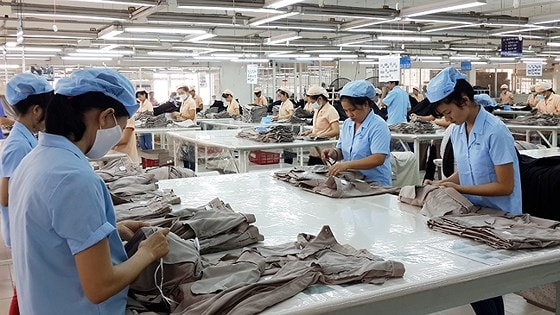Be careful with goods disguised as "made in Vietnam"
Faced with tensions in the US-China trade war, a number of industry associations have sent a message to the business community to "be cautious and wary of Chinese goods that may be disguised as Vietnamese goods for export to other countries, especially to the US market."
If this happens and is discovered, it will seriously affect the domestic manufacturing industry.
Specifically, recently, the Vietnam Leather, Footwear and Handbag Association warned that it is not possible to rule out the possibility that Chinese goods will be disguised as "made in Vietnam" for export when Chinese enterprises bring semi-finished products to Vietnam for processing or cooperate with Vietnamese enterprises and then attach Vietnamese labels for export.
At that time, the US can trace the origin of the product and impose anti-dumping tax, causing difficulties and affecting the reputation of Vietnamese enterprises. Therefore, enterprises should only accept investment and production cooperation right from the first stage.
At the same time, businesses should proactively diversify export markets on the basis of better utilizing free trade agreements that Vietnam has signed and will sign, and can use legal trade defense tools such as anti-dumping and anti-subsidy lawsuits...
 |
| With the current growth rate of Vietnam's textile and garment exports to the US, China choosing Vietnam as one of the intermediary countries to export to the US is a predictable scenario. |
Similarly, Chairman of the Vietnam Textile and Apparel Association Vu Duc Giang said that Chinese goods entering the US are subject to high tariffs, so China may try to label them as other countries, including Vietnam. Because Vietnam is a neighboring country of China, it is convenient for logistics.
At the same time, with the current growth rate of Vietnam's textile and garment exports to the US, China choosing Vietnam as one of the intermediary countries to export to the US is a predictable scenario.
According to Mr. Vu Duc Giang, recently China has continuously devalued the yuan, causing the price of Chinese export goods to decrease, causing great competitive pressure on Vietnamese goods. Previously, when the US-China trade war had just begun, Vice President of the Vietnam Steel Association Nguyen Van Sua admitted that there was a situation where Chinese steel exported to the US was disguised as Vietnamese steel.
And this issue is still being resolved. Currently, Vietnam's hot-rolled steel production capacity is sufficient to create CO (certificate of origin), not depending on imported raw materials from China. Therefore, the Vietnam Steel Association recommends that businesses should not assist in transferring the origin of steel from China to Vietnam for export to other countries.
According to the Vietnam Steel Association, the steel industry will not be able to avoid the impacts and decline in export proportion when the US-China trade tension continues to be tense. Currently, Vietnam's steel export turnover to the US market reaches about 500,000 tons out of a total of 40 million tons of imported steel (accounting for about 1.25%).
This number is not too large. To avoid the US imposing additional tariffs on Vietnamese steel from China, businesses need to be honest about the origin of their products. They should not lose their reputation in the international market for short-term benefits.
Not only industry associations, many economic experts are also concerned that if the above situation happens and is discovered by the US, the US may apply heavy sanctions on Vietnamese goods. Therefore, policymakers and industry associations need to quickly find solutions and widely propagate so that the business community understands and does not let unfortunate mistakes happen.
In the immediate future, the authorities need to strictly control the above-mentioned forms of trade fraud so that domestic goods are not affected and the US does not impose sanctions. According to analysis from the National Center for Socio-Economic Information and Forecast (NCIF), the US-China trade tension began to affect Vietnam in 2018 and will peak in the period 2020-2021.


